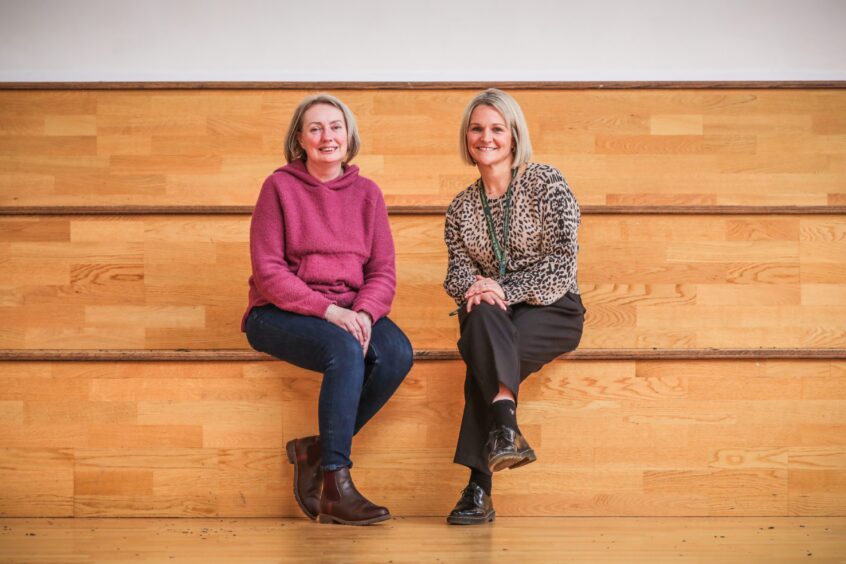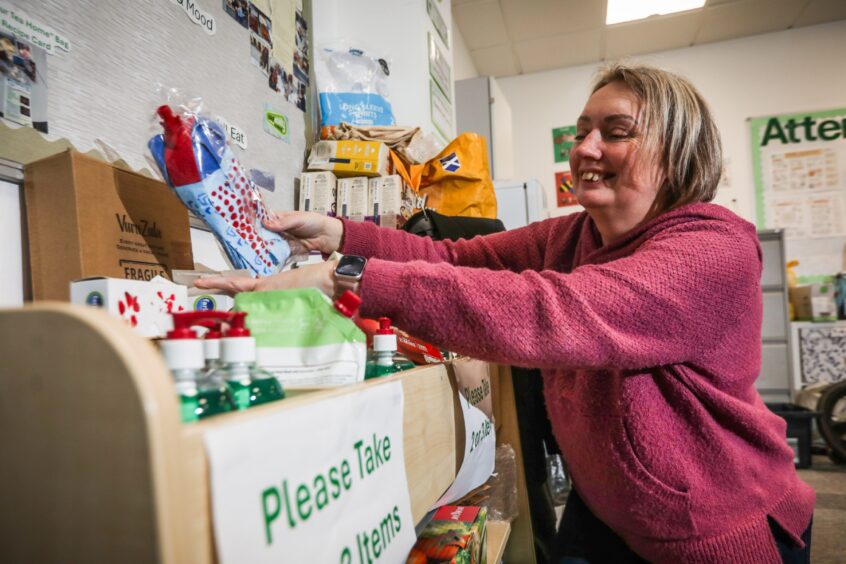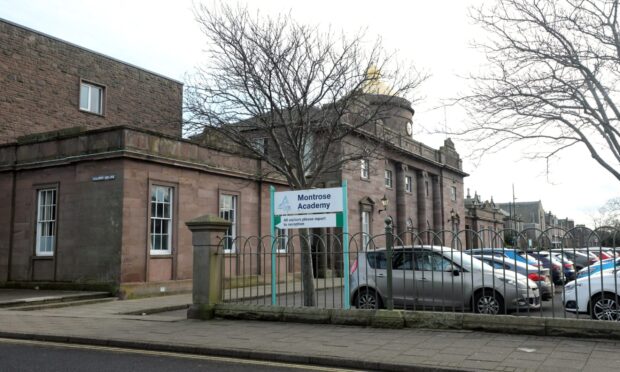The smell of toast greets pupils in the morning at Longhaugh and St Francis’ primary schools.
If it didn’t, some children would sit through classes hungry.
The Dundee schools – like others around the country – don’t just teach children. They ensure they are fed and clothed.
They even help ensure there is food and household supplies at home.
At North East Campus, which the two schools share with Quarry View Nursery, there are rails of school uniforms.
Cupboards and trolleys are stocked with essentials like toothpaste and washing powder.
Toasts and snacks provided daily
As well as bread for toasting, there’s a selection of snacks ready to hand out at breaktime.
School and family development officers Elaine Mearns and Shona Moffat are ready to act if a pupil has missed breakfast. Or if they spot a child squeezed into a uniform or shoes they have grown out of.
More than half of Longhaugh pupils and two-thirds of St Francis pupils live in deprived areas.
“Our breakfast provision is just part of what we do,” says Shona.
Longhaugh Primary pupils and their families know Shona well. The same is true for Elaine with St Francis’ population, for whom she is responsible. Children know they can pop into Shona and Elaine’s nurture hubs if they haven’t eaten before arriving in the morning.
St Francis head teacher Judith Duncan says: “They know where to go. It’s a discreet thing. There might be six or seven of them who will go to the nurture space on their way to register.
“That sets them up for learning.
“If they go to class with a hungry tummy that’s going to affect their focus.
“Or if they are worried about something at home, they can chat to Elaine then be ready for learning.
“It’s a long day ahead if they’ve not had anything.”
Class teachers are vigilant, and quick to spot if one of their pupils is in need of something. Whether that’s a quick bite to eat, or a new pair of shoes.
‘That’s part and parcel of what happens in school’
“They’ll be looking out for more vulnerable kiddies or kiddies we know are having a difficult time at home,” Judith says.
“They might say ‘pop down and see Elaine’. That’s part and parcel of what happens in school and what we offer.”
Schools across Dundee have people like Shona and Elaine. Their job is to know every single pupil and their families.
This means they can step in when they see support is needed.
That might be getting the kids new winter jackets from Dundee Bairns’ Cosy Bairns initiative.
Or it could be handing out a few essentials from the food larder and stock cupboard. Perhaps they will refer them to a foodbank.
Shona explains: “We don’t hold a lot of food in the school, just basics we can provide in an emergency situation.
“Generally we look at referrals to foodbanks and food larders. There are lots of local larders, Fintry Church and Fairfield Community Sports Hub, for example.
“We support referrals and sometimes we go to the foodbanks for families.”
Elaine adds: “A lot of families don’t have the means to get to the foodbank.
“At that point the parent might not have any money so they don’t have the bus fare to get there.
“So we’ll put the referral in and go and collect it and deliver it the family.”
Schools like St Francis’ and Longhaugh get donations of food, uniform and goods from organisations including local supermarkets, the Big House Multibank and bakery chain Greggs.
Visiting parents given household goods to cut shopping bills
Parents popping into the school for whatever reason might be offered supplies from the stock cupboard, perhaps nappies, shower gel, toilet roll.
This removes these items from their weekly shopping bill. As does the offer of daily breaktime snacks to all pupils. And not just for those in financial dire straits.
“It means parents can spend that bit of money on snacks for home or for something else,” says Longhaugh head teacher Nicola Jenkins.
“The cost of living affects everyone regardless of their postcode,” says Judith. “As much as we’re looking to support our vulnerable families, it’s universal.”
And it’s all done as discreetly and casually as possible, so parents aren’t embarrassed to take or seek help.
“They know there’s no judgement here because the relationships are there,” says Elaine. “We want our families to be know they can come through the door and ask us anything.
Almost half of Dundee children from deprived areas
“Our families do try so hard and they want to do all of these things themselves.
“But they know they can come and be either signposted or supported in their school which is probably something that wasn’t available to them when they were at school.”
As we leave Elaine and Shona are welcoming some nursery pupils and their parents. They are there to see the school they will be joining in August.
It’s the start of yet more relationships which will allow the pair to keep an eye on the welfare of the next generation of Longhaugh and St Francis’ pupils and families.
What happens at these two schools is far from unique. In fact over several years it has become the norm for Dundee schools and for many others across Scotland.
Almost half (46.3%) of Dundee’s primary school pupils come from the most deprived areas. That’s more than double the Scottish average (22.6%).
In the face of this level poverty, Dundee City Council pledged back in 2018 that no child or young person in the city would start school without a breakfast.
It also decided that every school would develop a ‘cost of the school day’ action plan.
No more dressing up for World Book Day
These plans set out how schools help reduce costs for families. For instance by making uniform cheaper, subsidising trips and removing costs of certain courses, such as providing ingredients for home economics.
As Longhaugh and St Francis’ do, many primary and secondary schools serve breakfast and hand out free snacks.
Action to help families in poverty goes well beyond providing food and keeping rails of uniforms and coats.
Many schools have also stopped inviting kids to dress up for World Book Day or Hallowe’en. Buying or making costumes could be so costly some parents kept children at home on these days to avoid forking out.
Other schools have swapped Christmas jumper day for a day of wearing something Christmassy. So a simple ribbon or piece of tinsel will suffice instead of a pricey jersey worn only a couple of times.
And for some families school funds or charity grants cover the cost of P7 residential trips to ensure children don’t miss out.













Conversation